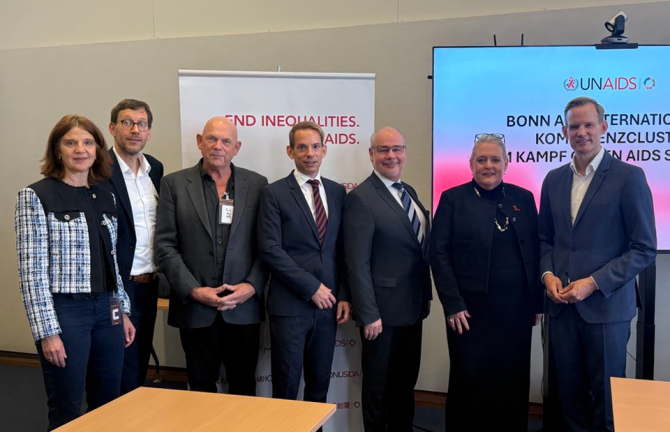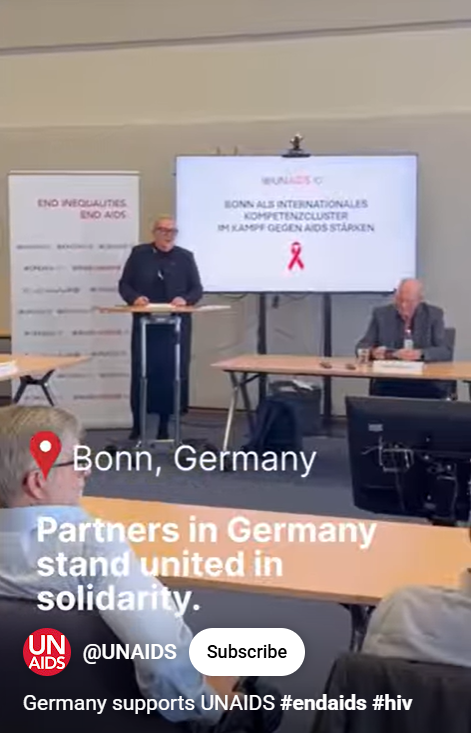

Feature Story
Germany steps up support to UNAIDS amidst HIV funding crisis
23 October 2025
23 October 2025 23 October 2025As global HIV funding faces mounting pressure, Germany is stepping up its support to ensure the world remains on track to end AIDS by 2030. As donors reduce contributions, UNAIDS and its partners are facing growing challenges in maintaining access to life-saving HIV prevention and treatment services worldwide. Germany’s leadership comes at a crucial time.
At the World Health Summit last week in Berlin, Germany announced an additional €2.5 million in core funding to UNAIDS, bringing its total core contribution for 2025 to €5.5 million. Germany also announced a €1 billion commitment to the Global Fund to Fight AIDS, TB and Malaria’s Eighth Replenishment.
Germany has long been one of UNAIDS’ most steadfast and trusted partners. With the support of the Federal Foreign Office, UNAIDS has established a major hub in Bonn as part of a broader transformation to make the organization more effective, efficient, and fit for purpose. The Federal Foreign Office has pledged an additional €500,000 to support the relocation of additional staff from Geneva to Bonn, as well as a €1.2 million contribution to strengthen UNAIDS’ work with LGBTIQ+ communities worldwide.
At an event held at the United Nations Campus in Bonn this week, around 30 representatives from the German Federal Government, academia, civil society, AIDS activists, and international development and global health organizations came together to explore how to further strengthen the partnership between UNAIDS and Germany and to reinforce Bonn’s role as a key global hub for health and HIV.
“Crisis often creates opportunities for change,” said Christine Stegling, UNAIDS Deputy Executive Director. “As UNAIDS redefines its structure to better serve the global AIDS response, Germany’s partnership is of central importance. It sends a powerful message when, at a time when others are stepping back, Germany steps forward—affirming that ending AIDS remains a political priority.”
The event also featured remarks by Georg Kippels, Parliamentary State Secretary of the Federal Ministry of health, who emphasized Germany’s founding role in establishing UNAIDS in 1996 and reaffirmed the Federal Government’s long-term support. “UNAIDS reaches people who are often left behind—people who use drugs, those facing discrimination and young women. Germany will continue to stand by UNAIDS to ensure that no one is excluded from the global AIDS response,” said Mr Kippels.
A subsequent panel discussion opened with a statement by Hendrik Streeck in his triple role as local Member of Parliament from Bonn, Director of the Institute of Virology at the University Hospital Bonn and Federal Commissioner on Drugs. Panelists Paul Zubeil, Federal Ministry of Health, Peter Wiessner, Action Alliance against AIDS and Anne von Fallois, Chief Executive Officer, German AIDS Foundation highlighted Germany’s leadership in the global response, the vital role of civil society, and new opportunities for collaboration within Bonn’s expanding AIDS competence cluster.
Paul Zubeil left no doubt that UNAIDS is a critical actor as the global context of the AIDS response is radically shifting: “The Federal Ministry of Health is working closely with UNAIDS and has seen it manouevering the new realities in a proficient manner. UNAIDS can support domestic stakeholders in high-burden settings to take more ownership while ensuring that key populations remain at the centre o the response. "The fundamental values of UNAIDS’ approach are based on scientific evidence, human rights, and the inclusion of key populations,” said Mr Wiessner. “UNAIDS brings everyone to the same table—governments, civil society, and affected communities—and that’s what makes it unique and invaluable.”
Hendrik Streeck underlined that medical innovation remains key to ending AIDS, citing the example of Lenacapavir, a new injectable drug that can protect a person from HIV infection for an entire year. “The Bonn research ecosystem is ideally placed to contribute to such breakthroughs,” he noted.
Anne von Fallois emphasized the importance of continued collaboration between international organizations and civil society actors based in Bonn. “UNAIDS plays an essential role in connecting us. In Bonn and across Germany, we must continue working together to ensure that HIV remains a priority on the global health agenda. UNAIDS provides us with information, guidance, and context for our work—and reminds all of us that the fight against HIV is not over yet.”
This year, UNAIDS is expanding its staff presence in Bonn to strengthen collaboration with the city’s leading global health research institutions and UN organizations. Once the current restructuring is complete, Bonn will become UNAIDS’ largest hub, underscoring its growing importance as a centre for innovation, research, and partnership in the global AIDS response.

